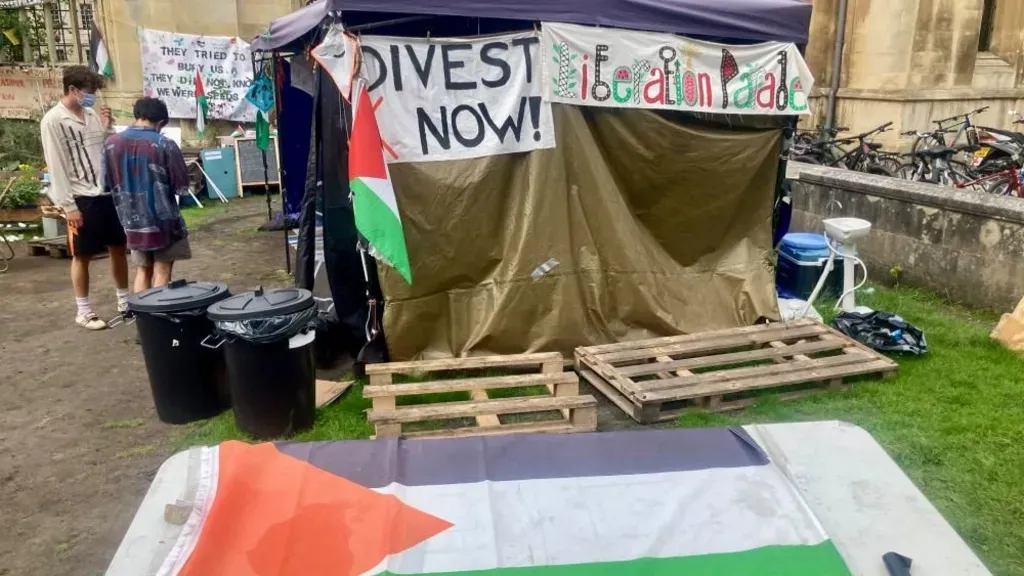In recent weeks, a protest camp established by university students has become the epicenter of a heated debate about institutional investment policies, particularly concerning the arms and defense industry. This protest is driven by concerns that the university’s investments may not align with its purported values. In response, the university administration has proposed significant discussions and the formation of a dedicated task force to address these concerns. This detailed examination explores the background of the protest, the university’s response, and the implications for both the institution and the broader community.
Background of the Protest
The Protest Camp’s Formation
The protest camp was set up by students who are deeply troubled by the university’s investment in the arms and defense industry. They argue that these investments contradict the university’s stated commitment to ethical and humanitarian values. The protest began as a response to what students perceived as a misalignment between the university’s financial practices and its ethical principles.
Core Concerns
Students have raised several core issues:
- Ethical Investment: The primary concern is that the university’s investments in defense-related industries are incompatible with its commitment to humanitarian principles.
- Institutional Values: Protesters argue that the university’s financial decisions should reflect its core values and ethical stance, particularly in light of ongoing humanitarian crises such as the one in Gaza.
- Transparency and Accountability: Students are demanding greater transparency regarding how investment decisions are made and a review of how these investments align with the university’s mission and values.
University’s Response
Proposal for Dialogue and Task Force
In response to the protest, the university has taken several steps to address the students’ concerns:
Formation of a Task Force and Working Group
The university has proposed the establishment of a task force and working group to review and potentially revise its investment policies. This proposal indicates a willingness to engage in meaningful dialogue with the protesting students and address their concerns about the ethical implications of its investments.
University Statement:
- Acknowledgment of Concerns: The university has acknowledged the strength of the feelings expressed by the students and committed to a review of its investment practices.
- Review Process: The review will focus on defining and monitoring defense-related exposures within the university’s investment portfolios.
- Dialogue Commitment: The administration has committed to working closely with the task force and working group to ensure that the university’s investment strategy aligns with its values.
Student Response and Future Plans
Mahmoud Atallah, a spokesperson for the protesters, expressed cautious optimism about the university’s response:
- Positive Step: Atallah described the university’s proposal as a positive development and a step in the right direction.
- Decamping Process: The protesters plan to begin the process of dismantling their camp over the next three to four weeks, reflecting their belief that their actions have led to a constructive response from the university.
- Broader Goals: While acknowledging the progress made, Atallah emphasized the desire for the university to address these issues in a more comprehensive and impactful manner.

University’s Engagement with the Issue
Ongoing Dialogue
The university has been engaged in discussions with students for several weeks, recognizing the gravity of the humanitarian situation in Gaza. The institution has respected the students’ right to protest within legal and community guidelines, while also managing the impact of the protest on the broader community.
University Statement:
- Humanitarian Focus: The university has expressed concern about the humanitarian tragedy unfolding in Gaza and has supported the right of students to raise awareness about this issue.
- Support and Reassurance: Efforts have been made to provide support and reassurance to the university community during the protest.
Policy Review and Governance
The university has agreed to explore several questions raised about its investment policy through its governance processes. The commitment to review investment practices is contingent upon the protest camp being dismantled, highlighting the university’s position that meaningful discussions will follow the conclusion of the encampment.

Implications and Future Directions
Impact on University Policy
The protest and subsequent university response could lead to significant changes in the institution’s investment policies:
- Ethical Investment Practices: The review process may result in a shift towards more ethical investment practices that better reflect the university’s values.
- Increased Transparency: Greater transparency in investment decisions may be implemented to address concerns about alignment with institutional values.

Broader Implications
The protest and the university’s response have broader implications:
- Student Activism: This event underscores the role of student activism in influencing institutional policies and promoting ethical considerations.
- Institutional Accountability: The case highlights the need for institutions to be accountable to their values and the concerns of their communities, particularly in relation to sensitive issues like investment in defense industries.
Conclusion
The protest camp established by students at the university has catalyzed a significant discussion about ethical investment practices and institutional values. The university’s response, involving the formation of a task force and working group, reflects a commitment to addressing these concerns. As the protest camp begins to dismantle, the focus will shift to the outcomes of the proposed review and the potential changes in investment policies. This case serves as a reminder of the importance of aligning institutional practices with stated values and the impact of student activism in driving meaningful change.


